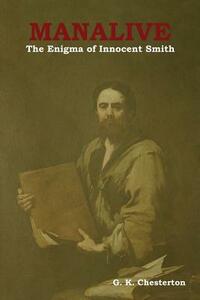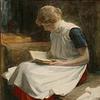Take a photo of a barcode or cover
Essentially a novelization of Orthodoxy with all of Chesterton’s humor, wit and sharp insight.
not all may appreciate, i admit. the bouncing philosophical journey of Mr. Innocent Smith will make you feel good about your current sitaution, whatever the hell it is.
I did it.
I think this could have been a short story.
I think this could have been a short story.
Minor: Racism
What a delightful little book to remind us that we must turn the world upside down from time to time in order to really live.
First-rate British cheek mixed with contrarian common sense and a healthy dose of theology.
First-rate British cheek mixed with contrarian common sense and a healthy dose of theology.
funny
mysterious
medium-paced
Plot or Character Driven:
A mix
Strong character development:
Complicated
Loveable characters:
Complicated
Diverse cast of characters:
No
Flaws of characters a main focus:
No
A humorous, philosophical short novel from 1912 concerning a mysterious figure, Innocent Smith, who turns up at (and disrupts) an English boarding house.
This was the first book in a series of buddy reads I am doing with my dad of his favourite books. I definitely enjoyed it, but not sure I'm as much of a fan of it as he is. It's definitely amusing at times, with a wonderful turn of phrase at times. but I found it a bit convoluted and more concerned with it's message than with telling a story.
This was the first book in a series of buddy reads I am doing with my dad of his favourite books. I definitely enjoyed it, but not sure I'm as much of a fan of it as he is. It's definitely amusing at times, with a wonderful turn of phrase at times. but I found it a bit convoluted and more concerned with it's message than with telling a story.
In Thursday and this I feel I've found a theme or two. Both books are vividly, almost unreadably surreal at times. They both tend to lose the reader in fast paced bizarre sequences in first half or so, but the picture becomes much clearer in hindsight. Chesterton doesn't focus so much on the plausibility or even sequence of events, but hinges his work on the enjoyability of the prose, the characters, and the fleshing out of the underlying philosophical probing. The books feels like it was written in a rush to get the concepts out on paper before he forgot them, but then the concepts really are quite impressive to consider. Chesterton is master of the mind-bender.
At first, I didn't think I would enjoy this book, but it's like Chesterton held the gun up to me and reminded me to be alive while I'm still living. It was an inspiring book and a unique, interesting look at life.
My favorite quote from the book: "Oh, it isn't like anything but itself."
My favorite quote from the book: "Oh, it isn't like anything but itself."
Grass and garden trees seemed glittering with something at once good and unnatural like a fire from fairyland. It seemed like a strange sunrise at the wrong end of the day.
Extremely quotable, excessively enjoyable, occasionally mystifying. Not quite on a level with the other Chesterton novellas I've read but vastly better than most modern literature. Full of northernness and the aching beauty of goodness midst evil. Well worth the read.
Marriage is a duel to the death which no man of honour should decline.
"Imprudent marriages! And pray where in earth or heaven are there any prudent marriages? You never know a husband till you marry him. Unhappy! Of course you'll be unhappy! Who the devil are you that you shouldn't be unhappy, like the mother that bore you?"
"You spoke with authority, and not as the scribes. Nobody could comfort me if you said there was no comfort. If you really thought there was nothing anywhere, it was because you had been there to see. Don't you see that I had to prove you didn't really mean it? Or else drown myself in the canal."
"I don't want people to anticipate me as a well-known practical joke. I want both my gifts to come virgin and violent, the death and the life after death. I am going to hold a pistol to the head of the Modern Man. But I shall not use it to kill him. Only to bring him to life."
"Every revolution — like every repentance —is a return... My revolution, like yours, like the earth's, will end up in the holy, happy place, the celestial, incredible place — the place where we were before."
"I do believe in breaking out; I am a revolutionist. But don't you see that all these real leaps and destructions and escapes are only attempts to get back to Eden — to something we have had, to something at least we have heard of? Don't you see one only breaks the fence or shoots the moon in order to get home?"
We are all in exile, and no earthly home can cure the holy homesickness that forbids us rest.
"God bade me love one spot and serve it... so that this one spot might be a witness against all the infinities and the sophistries, that Paradise is somewhere and not anywhere, is something and not anything."
The man's spiritual power has been precisely this: that he has distinguished between custom and creed. He has broken the conventions, but he has kept the commandments.
Extremely quotable, excessively enjoyable, occasionally mystifying. Not quite on a level with the other Chesterton novellas I've read but vastly better than most modern literature. Full of northernness and the aching beauty of goodness midst evil. Well worth the read.
Marriage is a duel to the death which no man of honour should decline.
"Imprudent marriages! And pray where in earth or heaven are there any prudent marriages? You never know a husband till you marry him. Unhappy! Of course you'll be unhappy! Who the devil are you that you shouldn't be unhappy, like the mother that bore you?"
"You spoke with authority, and not as the scribes. Nobody could comfort me if you said there was no comfort. If you really thought there was nothing anywhere, it was because you had been there to see. Don't you see that I had to prove you didn't really mean it? Or else drown myself in the canal."
"I don't want people to anticipate me as a well-known practical joke. I want both my gifts to come virgin and violent, the death and the life after death. I am going to hold a pistol to the head of the Modern Man. But I shall not use it to kill him. Only to bring him to life."
"Every revolution — like every repentance —is a return... My revolution, like yours, like the earth's, will end up in the holy, happy place, the celestial, incredible place — the place where we were before."
"I do believe in breaking out; I am a revolutionist. But don't you see that all these real leaps and destructions and escapes are only attempts to get back to Eden — to something we have had, to something at least we have heard of? Don't you see one only breaks the fence or shoots the moon in order to get home?"
We are all in exile, and no earthly home can cure the holy homesickness that forbids us rest.
"God bade me love one spot and serve it... so that this one spot might be a witness against all the infinities and the sophistries, that Paradise is somewhere and not anywhere, is something and not anything."
The man's spiritual power has been precisely this: that he has distinguished between custom and creed. He has broken the conventions, but he has kept the commandments.
I liked the first half a lot. The second half had good flashes, but most of the accounts were WAY longer than they needed to be, which made me dread returning to the book.






